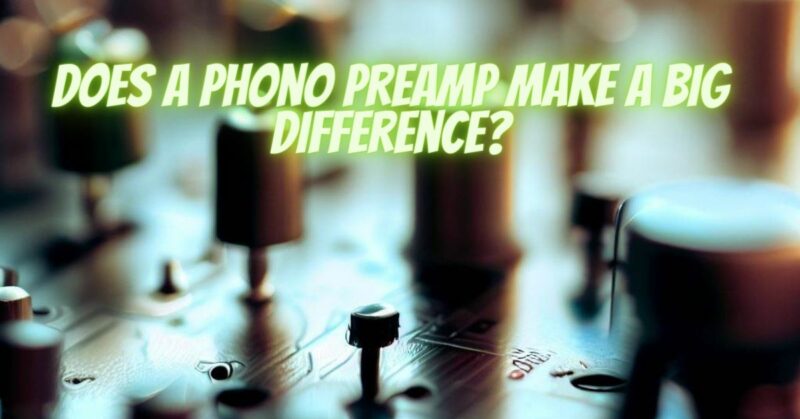For vinyl enthusiasts, the quest for the ultimate sound quality from their turntable setup is a never-ending pursuit. Among the various components that contribute to the overall fidelity of vinyl playback, the phono preamp, or phono stage, holds a significant role. In this article, we delve into the question of whether a phono preamp makes a substantial difference in the vinyl listening experience, and highlight the key factors that contribute to its impact.
- Amplification and Signal Optimization:
One of the primary functions of a phono preamp is to amplify the delicate phono signal produced by the turntable’s cartridge. A well-designed phono preamp with high-quality components and precise amplification capabilities can make a noticeable difference in the overall sound quality. It ensures that the low-level phono signal is amplified accurately and efficiently, preserving the nuances, dynamics, and details of the music. By providing optimal amplification, a quality phono preamp can elevate the listening experience, making the sound more engaging, immersive, and lifelike.
- RIAA Equalization and Frequency Response:
Vinyl records are mastered with a specific equalization curve known as the RIAA (Recording Industry Association of America) curve. The phono preamp incorporates RIAA equalization circuitry to restore the frequency response of the original recording. A precise and well-implemented RIAA equalization in a phono preamp ensures that the tonal balance, dynamics, and details of the music are faithfully reproduced. This accuracy in frequency response contributes significantly to the overall fidelity of the sound, allowing the listener to experience the intended tonal characteristics of the recording.
- Noise Reduction and Signal Integrity:
Vinyl records are susceptible to various types of noise, including surface noise, clicks, and pops. A high-quality phono preamp incorporates features to minimize these unwanted artifacts. Advanced circuitry, shielding techniques, and effective grounding help reduce electrical and environmental noise, resulting in a cleaner and more transparent audio signal. By minimizing noise interference, a quality phono preamp allows the listener to fully immerse themselves in the music, without distractions or disturbances.
- Cartridge Compatibility and Impedance Matching:
Different turntable cartridges have unique electrical characteristics, and a phono preamp with adjustable gain settings and impedance options ensures compatibility with a wide range of cartridges. Proper matching of cartridge impedance with the preamp’s input impedance minimizes signal loss and distortion, enabling optimal signal transfer. The right cartridge-preamp combination can unlock the full potential of the turntable, revealing the finer details, dynamics, and tonal accuracy of the vinyl recordings.
Conclusion:
A phono preamp does indeed make a significant difference in the vinyl playback experience. Through its amplification capabilities, precise RIAA equalization, noise reduction features, and compatibility with various cartridges, a quality phono preamp elevates the sound quality and enhances the overall fidelity of vinyl records. It preserves the integrity of the music, reproduces the intended tonal characteristics, and minimizes unwanted noise and distortion. By investing in a well-designed phono preamp and pairing it with a suitable cartridge, vinyl enthusiasts can truly unlock the potential of their turntable setup, bringing the music to life with richness, depth, and clarity.


